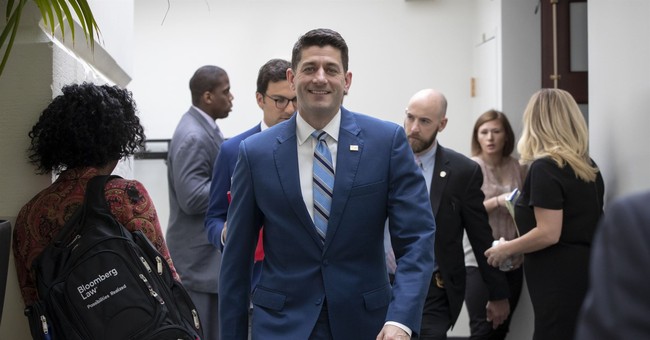
Posted on 05/05/2018 9:18:13 AM PDT by Kaslin

The long-awaited 2018 edition of the Congressional Budget Office’s (CBO) Budget and Economic Outlook was released this month. It does not paint a rosy picture of the nation’s fiscal future, projecting $12.4 trillion in additional debt over the next decade. If past estimates are any indicator, however, that doesn’t reflect reality. Without a substantial change to the culture of overspending in Washington, the country’s fiscal situation is likely even worse.
Ten years ago, CBO estimated that Congress would run a $151 billion surplus this past fiscal year. Instead, the country ran a $665 billion deficit. That’s in part because CBO conducts its analysis based on “current policy,” whereby lots of expensive provisions expire, making the long-term fiscal situation look better than it is likely to be. The economic crisis also bears some blame for the disparity, of course, but by 2009, with the stimulus law already passed, CBO still projected a FY 2017 deficit of “only” $234 billion.
From 2017 to 2018, CBO’s estimate of debt accumulation over the next decade has increased from $9.4 trillion to $11.7 trillion. Some would be eager to place the blame squarely on the tax reform law for this disparity, but that would be a mistake. CBO’s 2018 estimate of revenues has dropped by approximately $1 trillion relative to its 2017 estimate, but its 2018 estimate of spending over the next ten years has also increased by around $1 trillion compared to 2017. Even after taking into account likely extensions of current policy, the tax reform law will raise the nation’s debt-to-GDP ratio by 2027 from 111 percent to 114 percent.
CBO’s estimates also frequently fall victim to members of Congress “legislating to the score.” Because CBO scores the fiscal impact of legislation over a ten-year period, Congress often games the system to ensure that the ten-year score appears lower than it is.
One example of this is so-called “tax extenders.” Each year, Congress reauthorizes the same set of tax breaks to last another year or two, rarely eliminating or making permanent any of them. The tax breaks are effectively permanent, and should show a ten-year budget impact of well over $100 billion. Yet because taxes are technically “temporary,” they score out to $10 billion, reflecting only one more year’s worth after which they are assumed to expire.
Another example of this practice of legislating to the score will have a far greater budgetary impact. The recent Bipartisan Budget Act (BBA) technically only “delayed” the caps on spending put in place under the Budget Control Act of 2011, even though the reality is that the caps are very unlikely to return. As a result, the CBO scored the BBA as “only” adding $320 billion to the debt over the next ten years (itself a significant spending increase), not accounting for additional spending that is virtually certain to occur.
The National Taxpayers Union Foundation’s Demian Brady analyzed the impact of the BBA on the debt, accounting for this and other gimmicks. He found that the real cost of the BBA to taxpayers was $1.66 trillion, five times more than estimated. Unfortunately, such tactics to mislead the public into thinking Congress is spending less than it is are par for the course in Washington.
A number like $12.4 trillion in added debt is a significant and daunting figure. It represents a more than 50 percent increase to the current national debt, which has already blown past $21 trillion. But taxpayers should be aware that it likely does not give the full picture, as budget gimmicks and the inevitable spending increases that each year brings will likely drive that number up even further. This may be the current policy baseline, but Congress’s current policy is to spend profligately whenever it pleases.
No, they scored it as reducing the deficit in the long term, not the budget.
The ACA was supposed to raise taxes by a little more than the program cost, thus reducing the deficit.
Yes, I misspoke. Deficit, not budget.
Here’s a question, since you’re so quick, and I don’t remember: Was the deficit forecast to decline due to reduced outlays or increased funding?
Funding, absolutely.
There was no question that Ocare involved new spending, but the new medical device tax, penalties for non-coverage, Cadillac tax, and the surtaxes on high earners were to more than cover it, thereby reducing the deficit.
And to be really anal, it's not the deficit either. It's the "budget deficit," or even more precisely, the "federal budget deficit." :)
Thanks for the refresher. Was only 2009, but that’s actually quite a long time ago now!
$20T @ 2% = $400B. 2% is a below average rate.
Avg rate is 5%.
$20T @ 5% = $1T.
5% is an average rate. The rate could go higher in the next 10 years.
And that is without borrowing a single extra dollar - simply based on current debt (actually - the figure is now higher).
Only around $15T is “public” - meaning outside of intra-governmental loans (like the Social Security “trust fund” that Congress spends out of illegally)
Supposedly - current year debt interest being paid out by Federal Government is between $300-400 BILLION -
It is my long-held contention that the CBO has NEVER BEEN CORRECT IN ANY PROGNOSTICATION!
Can anyone show me a time the CBO got it right?
Disclaimer: Opinions posted on Free Republic are those of the individual posters and do not necessarily represent the opinion of Free Republic or its management. All materials posted herein are protected by copyright law and the exemption for fair use of copyrighted works.